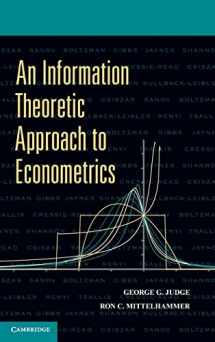
An Information Theoretic Approach to Econometrics
Book details
Summary
Description
This book is intended to provide the reader with a firm conceptual and empirical understanding of basic information-theoretic econometric models and methods. Because most data are observational, practitioners work with indirect noisy observations and ill-posed econometric models in the form of stochastic inverse problems. Consequently, traditional econometric methods in many cases are not applicable for answering many of the quantitative questions that analysts wish to ask. After initial chapters deal with parametric and semiparametric linear probability models, the focus turns to solving nonparametric stochastic inverse problems. In succeeding chapters, a family of power divergence measure-likelihood functions are introduced for a range of traditional and nontraditional econometric-model problems. Finally, within either an empirical maximum likelihood or loss context, Ron C. Mittelhammer and George G. Judge suggest a basis for choosing a member of the divergence family.


We would LOVE it if you could help us and other readers by reviewing the book
Book review



